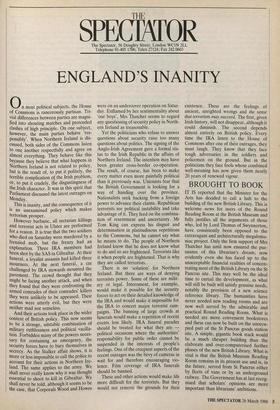The Spectator, 56 Doughty Street, London WC1N 2LL Telephone 01-405
1706; Telex 27124; Fax 242 0603
ENGLAND'S INANITY
n most political subjects, the House of Commons is rancorously partisan. Tri- vial differences between parties are magni- fied into shouting matches and pretended clashes of high principle. On one subject, however, the main parties behave 'res- ponsibly'. When Northern Ireland is dis-. cussed, both sides of the Commons listen to one another respectfully and agree on almost everything. They behave like this because they believe that what happens in Northern Ireland is not related to policy, but is the result of, to put it politely, the terrible complication of the Irish problem' , or, to put it crudely, the disgustingness of the Irish character. It was in this spirit that Parliament discussed the latest outrages on Monday. This is inanity, and the consequence of it is an unexamined policy which makes terrorism prosper. However barbaric, all sectarian killings and terrorist acts in Ulster are performed for a reason. It is true that the two soldiers who died on Saturday were murdered by a frenzied mob, but the frenzy had an explanation. Three IRA members had been shot by the SAS in Gibraltar. At their funeral, a loyalist assassin had killed three mourners. At the next funeral, a car challenged by IRA stewards mounted the pavement. The crowd thought that they might be facing another attack, and when they found that they were confronting the armed comrades of their comrades' killers they were unlikely to be appeased. Their actions were utterly evil, but they were neither mad nor senseless.
And their actions took place in the wider Context of British policy. This now seems to be a strange, unstable combination of military ruthlessness and political vacilla- tion. Forbidden many of the powers neces- sary fol. containing an emergency, the security forces have to bury themselves in secrecy. As the Stalker affair shows, it is more or less impossible to call the.police to account for their actions in Northern Ire- land. The same applies to the army. We shall never really know why it was thought essential to shoot to kill in Gibraltar: We shall never be told, although it seems to be the case, that Corporals Wood and Howes were on an undercover operation on Satur- day. Enflamed by her sentimentality about `our boys', Mrs Thatcher seems to regard any questioning of security policy in North- ern Ireland as treasonable.
Yet the politicians who refuse to answer questions about security raise too many questions about politics. The signing of the Anglo-Irish Agreement gave a formal sta- tus to the Irish. Republic in the affairs of Northern Ireland. The intention may have been greater cross-border co-operation. The result, of course, has been to make every matter even more painfully political than it previously was. Unionists fear that the British Government is looking for a way of handing over the province. Nationalists seek backing from a foreign power to advance their claims. Republican terrorists see political instability and take advantage of it. They feed on the combina- tion of resentment and uncertainty. Mr Tom King can express his disgust and determination in platitudinous repetitions to the Commons, but he cannot say what he means to do. The people of Northern Ireland know that he does not know what to do and so are frightened. Terrorists like it when people are frightened. That is why they are called terrorists.
There is no 'solution' for Northern Ireland. But there are ways of denying terrorists power. Some of these are milit- ary or legal. Internment, for example, would make it possible for the security forces to act on their detailed knowledge of the IRA and would make it impossible for the IRA to concert major terrorist cam- paigns. The banning of large crowds at funerals would make a repetition of recent events less likely. IRA funeral parades should be treated for what they are political occasions where the authorities' responsibility for public order cannot be suspended in the interests of people's feelings. One of the creepiest aspects of the recent outrages was the bevy of cameras in wait for and therefore encouraging vio- lence. Film coverage of IRA funerals should be banned.
These and other actions would make life more difficult for the terrorists. But they would not remove the grounds for their existence. These are the feelings of ancient, unrighted wrongs and the sense that terrorism may succeed. The first, given Irish history, will not disappear, although it could diminish. The .second depends almost entirely on British policy. Every time the IRA listen to the House of Commons after one of their outrages, they must laugh. They know. that they face tough adversaries in the soldiers and policemen on the ground. But in the politicians they face fools whose combined well-meaning has now given them nearly 20 years of renewed vigour.


















































 Previous page
Previous page